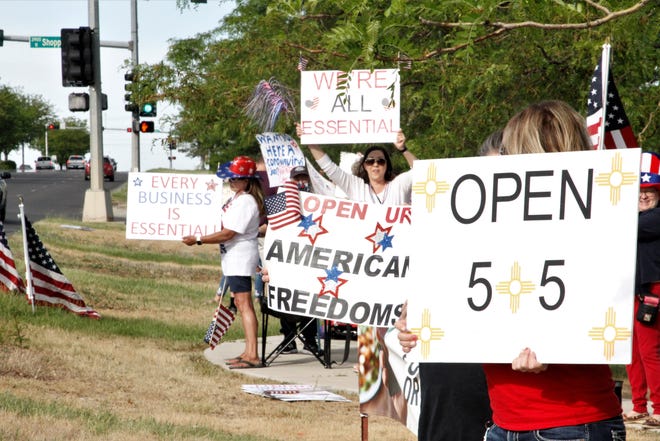Republican lawmakers file legislation focused on COVID restrictions' impact on businesses
AZTEC — As businesses struggle amid the pandemic restrictions, state lawmakers are looking for ways to provide relief to businesses that have been impacted by the restrictions enacted to reduce the spread of COVID-19.
The legislative session begins at noon on Jan. 19 and discussion of ways to address the COVID-19 pandemic will likely be a dominant topic this year.
Sen. Cliff Pirtle, R-Roswell, is sponsoring several pieces of legislation aimed at helping businesses that have been hit hard by the restrictions.
One of these bills would create a reparation tax credit for small businesses that closed as a result of the pandemic. Pirtle proposes appropriating $55 million from the general fund to a special pandemic reparations fund.
Others are reading:Pre-filed legislation topics range from taxes to the environment to school funding
In a separate bill that Pirtle has pre-filed, he proposes waiving interest and penalties that would normally be assessed for the failure to pay gross receipts tax. This would date back to the start of the public health emergency orders and continue until two months after the orders are lifted.
After that, business owners would be expected to pay in full the unpaid taxes “on or before the twenty-fifth day of the third month following the expiration or rescission of the public health order,” the pre-filed legislation states.

Meanwhile, the ongoing public health emergency orders have caused frustration and led to protests across the state.
Sen. Gregory Baca, R-Belen, has filed legislation that would limit the governor’s power to extend public health emergency orders that restrict gatherings of people or close public places. Baca proposes that a public health emergency order automatically expire after 14 days.
At that point, the governor would not be able to extend the order or renew or amend it without legislative approval. The governor would also not be allowed to issue a new order.
Keep reading:Pre-filed legislation topics range from taxes to the environment to school funding
If passed, the Legislature would be able to approve extending the public health orders through a joint resolution or, if the Legislature was not in session, a joint statement issued by at least three of the following individuals: the senate president pro tempore, the minority floor leader of the senate, the speaker of the house of representatives or the minority floor leader of the house of representatives.
In addition to the COVID-19 pandemic, here is a look at some of the other pieces of pre-filed legislation.
Non-partisan election for county clerks, secretary of state

Currently, the elected officials who oversee elections are elected in partisan races, but Sen. Bill Tallman, D-Albuquerque, would like to see that change. Tallman has filed a senate joint resolution that would make the county clerks and the secretary of state run in the non-partisan elections in November of odd-numbered years.
If the senate joint resolution passes, it would be placed on the ballot for voters to either reject or approve.
Industrial revenue bonds
Energy projects for electrical generation often use industrial revenue bonds. These bonds are secured by a government agency on behalf of a private sector company. The bonds exempt a project from certain types of taxes, including property taxes. However, companies generally make payments in-lieu of taxes.
More:PRC extends utility disconnection moratorium, but says legislative action is needed
Sen. Steve Neville, R-Farmington, has filed legislation that would change the method for determining the payments in-lieu of taxes for electric generation or transmission projects.
New construction wired for solar, EVs

As New Mexico prepares for an increase in electric vehicle ownership and more people installing solar on their homes, a Democratic senator from Las Cruces has filed legislation to make that transition easier.
Sen. William Soules proposes that all new construction be wired to make it easy to install solar panels and charging apparatus for electric vehicles.
Sustainable Economy Task Force
Sen. Mimi Stewart, D-Albuquerque, has proposed a taskforce that would identify ways to transition into a sustainable economy that does not rely on extractive industries. This taskforce would create an annual strategic plan starting with fiscal year 2022 and continuing through fiscal year 2027. This strategic plan would look at ways to transition New Mexico away from its reliance on fossil fuel extraction.

Hannah Grover covers government for The Daily Times. She can be reached at 505-564-4652 or via email at hgrover@daily-times.com.
Support local journalism with a digital subscription: http://bit.ly/2I6TU0e